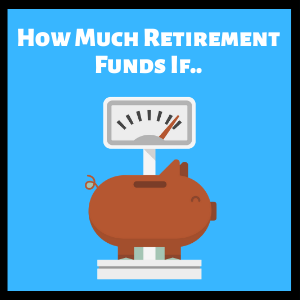For some of us, retirement is still far away.
We know it’s on the horizon, and it will come.
But because it’s still decades away, it’s not on our watchlist (until it’s too late).
Today, we’ll see how taking small steps enables you to surmount mountains.
Read on!
It All Begins With a Retirement Shortfall
Knowing where you stand, no matter how old you are, is the beginning of your retirement planning journey.
Without accounting for what you have right now, and deciding on how much you need for retirement, the plan will always fail.
To find out how much you should have, you can use our retirement calculator.
If you’re still young, there’s almost always a shortfall – your current assets and not enough for you to retire.
And when you’ve made big investments in your career/business, you’d want to find out how to make use of your excess cash.
SIDE NOTE When was the last time you conducted thorough financial planning or reviewed your finances? In this day and age in Singapore, doing so will absolutely improve the quality of life for you and your loved ones. Here are 5 reasons why financial planning is so important.
Utilise the Power of Compounding
Making use of the money you’ve accumulated simply means to get more on the dollar.
To get “interest on interest”.
This is when compounding interest comes in.
If you’ve used our compound interest calculator, you would’ve known that understanding the concept is vital.
To compound your money further, here are 2 main takeaways:
- get higher interest
- stretch your investment horizon
Here are some illustrations to show the power of compounding.
How Much You Would’ve Accumulated for Retirement If…
Here are some illustrations to show different starting ages, monthly amount invested, and type of investments..
Assumptions made:
- figures are based on percentage returns which stays fixed throughout
- compounding frequency is annually
- retirement age is 65
- initial investment is the monthly amount, and subsequent monthly investments are made at the end of the month
| Starting Age | Monthly Investments | 1% | 3% | 5% |
| 30 | $500 | $251,813 | $369,140 | $556,989 |
| $1,000 | $503,627 | $738,281 | $1,113,978 | |
| $2,000 | $1,007,254 | $1,476,563 | $2,227,957 | |
| 35 | $500 | $210,338 | $290,570 | $409,848 |
| $1,000 | $420,676 | $581,140 | $819,697 | |
| $2,000 | $841,352 | $1,162,280 | $1,639,395 | |
| 40 | $500 | $170,875 | $222,794 | $294,560 |
| $1,000 | $341,751 | $445,588 | $589,120 | |
| $2,000 | $683,502 | $891,177 | $1,178,241 | |
| 45 | $500 | $133,328 | $164,330 | $204,228 |
| $1,000 | $266,657 | $328,660 | $408,457 | |
| $2,000 | $533,314 | $657,321 | $816,915 | |
| 50 | $500 | $97,603 | $113,898 | $133,451 |
| $1,000 | $195,207 | $227,797 | $266,903 | |
| $2,000 | $390,414 | $455,594 | $533,807 | |
| 55 | $500 | $63,612 | $70,395 | $77,996 |
| $1,000 | $127,225 | $140,791 | $155,992 | |
| $2,000 | $254,451 | $281,583 | $311,984 | |
| 60 | $500 | $31,271 | $32,870 | $34,545 |
| $1,000 | $62,543 | $65,740 | $69,090 | |
| $2,000 | $125,086 | $131,480 | $138,180 |
3 Inferences From All These
From the figures above, here are 3 things you can do to achieve your retirement goals.
DID YOU KNOW? According to a survey conducted by MoneySense, about 3 out of 10 Singapore residents aged 30 to 59 had not started planning for their future financial needs. This isn't surprising because personal finance can seem complicated and daunting. But really, there are only a few things that you should focus on. Learn how to significantly improve your personal finances with the 7-step "wedding cake" strategy today.
1) Save/invest more
It goes without saying that the more you save, the more you’ll have in the future.
It’s all about delayed gratification. Forgoing low priority expenses (without compromising on your standards of living) will allow you to accumulate and compound more, so that when the time comes, you can do much more.
Saving is just one part of the equation. To make it grow, you’ll need to utilise the different types of investments.
2) Start early
The earlier you start doing something for your retirement, the burden of it lessens.
This is because the amount of retirement funds you need stays relatively fixed (according to what kind of lifestyle you want).
For every second that is delayed, you’ll need to make it up somewhere:
- With a shorter period to accumulate, you may need to save/invest an even higher monthly amount
- You may need to resort to taking higher risks just to be able to hit that retirement goal
So start saving if you haven’t – start small to get your feet wet.
3) Get higher potential returns
The trade-off of risk and return is always there.
Everyone wants to have higher returns but sometimes, they might not be able to stomach the potential risks.
If you’re still young, then the longer time horizon allows you to recover. But if you’re old, there isn’t much that you can do.
In addition, the circumstances of everybody are different.
But in general, you’d want to have adequate emergency funds (6 months to 1 year) set aside in a liquid asset like a savings account or fixed deposit.
And then, the rest of your excess money can be placed into various investment options depending on your risk appetite.
What’s Next?
You may have heard about these concepts mentioned above.
They’re constantly repeated till it’s boring.
But its simplicity can’t be ignored.
The numbers and illustrations allow you to see what can be achieved.
But to achieve it, taking action is the only way.
If you’re keen, start planning for retirement without the need for everything to be perfect.
It’s a journey, so start small.
In the meantime, check out some of the best retirement investment options in Singapore.


